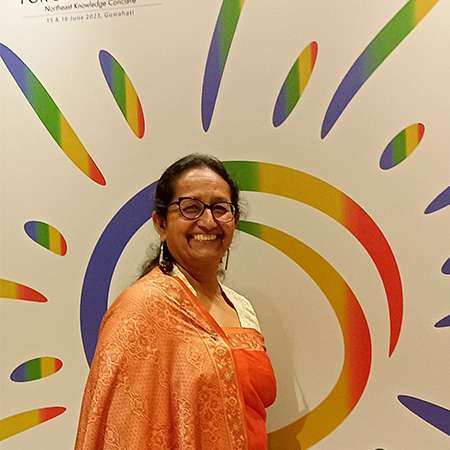8:00 a.m -6:00 p.m
-
-
-
RMZ Ecoworld, Bellandur, Outer Ring Road
8:00 a.m -6:00 p.m
RMZ Ecoworld, Bellandur, Outer Ring Road

Dr. Shaibya Saldanha is a mental health and trauma informed Obstetrician and gynecologist with over 31 years of practice experience in Bangalore. She is also a lactation consultant and a sexuality educator.
Experience: 30 Years of experience
Language: English, Hindi
Fees: To be Updated. Please Whatsapp for further Details.
Do I work with a sliding scale-No


Dr Shaibya Saldanha completed her MD in 1993 from Bombay University. She worked in Grant Medical College, Mumbai and then in St. John‘s Hospital, Bangalore for 7 years. Along with Dr Saksena, she co-founded Enfold Proactive health Trust in 2001
She is a practising gynaecologist and co-founder of Enfold Proactive Health Trust, an orgnisation that addresses gender and sexuality with a special emphasis on child sexual abuse, through education, training, research, advocacy, and tangible support.
Dr Saldanha was formerly associate professor at the department of obstetrics at St John’s Medical College, Bangalore.
Appearing as an expert witness during the trial of a case of child sexual abuse, Dr Saldanha realized the lack for support available to the child victim and their caregivers as they navigated the lengthy and often confusing medico-legal system. In 2010, she underwent training on management of child sexual abuse and creation of child protection units in Philippines with support from ISPCAN and UNICEF. Later, she began offering this support in India and thus began Enfold’s Support and Rehabilitation Team.
She continues to share her time between her commitment to Enfold and her medical practice and engagement with the government to promote maternal health.
Dr. Shaibya Saldanha, a practicing gynaecologist and mother of two, is a trainer and speaker on issues of health, sexuality and child sexual abuse in the country. Trauma is common among those seeking Ob-Gyn care and may have pervasive impact on obstetrical and gynaecological health, social functioning, and healthcare engagement. By recognizing the signs of trauma and initiating or referring to appropriate treatments, she provides her patients with a unique opportunity to better understand their concerns and to improve their care.
MBBS
MD(OB-GYN )
Queer friendly
Judgement free
Sex positive
Recognize the prevalence and effect of trauma on patients and incorporate trauma-informed approaches to delivery of care.
She is familiar with the trauma-informed model of care and strive to universally implement a trauma-informed approach across all levels of her practice with close attention to avoiding stigmatization and prioritizing resilience.
Trauma is prevalent among patients seeking obstetrical and gynaecological care, and it can have a lasting effect on social functioning, healthcare involvement, and obstetrical and gynaecological health.
Although there are standards about the identification and management of perinatal and postnatal mood and anxiety disorders in obstetrics and gynaecology, there is less clarity regarding the role of obstetricians and gynaecologists in recognizing and treating patients' traumatic experiences and associated symptoms.
Obstetrics and gynaecology regularly witness a range of health impacts that may be linked to trauma, such as difficult periods, debilitating PMSs, persistent pelvic discomfort, PCOS/PCOD, Endometriosis, STDs, vaginismus, unwanted pregnancies, conflicting attitudes regarding pregnancy and sexuality, and difficulties with infant attachment after delivery.
The prevalence of trauma and the potentially severe and long-lasting effects of trauma-related symptoms make it imperative that trauma be addressed as part of Ob-Gyn treatment. Ob-Gyn practitioners have a special chance to get to know their patients better and provide better care by identifying the symptoms of trauma and starting or referring patients to the right treatments.
Our team of Obstetrician and gynaecologist are educated themselves on the trauma-informed model of care and work toward implementing a trauma-informed approach at all practice levels, paying special attention to resilience and avoiding stigmatization.
The physical transition a girl's body goes through during puberty to become an adult body fit for sexual reproduction. Hormonal impulses travel from the brain to the ovaries to start it. It is the formative stage of childhood, the initial years of a woman's existence. Due to its direct detrimental impact on mental health, recent research indicates that adverse childhood experiences or (ACEs) raises the chance of an earlier puberty.
In turn, this early pubertal period accelerates the risk of psychopathology (Colich et al., 2020a). When combined, they would result in a double-edged impact of trauma exposure on the likelihood of mental illness through direct impacts and indirect effects due to pubertal timing.
*Colich, N. L., Platt, J. M., Keyes, K. M., Sumner, J. A., Allen, N. B., & McLaughlin, K. A. (2020). Earlier age at menarche as a transdiagnostic mechanism linking childhood trauma with multiple forms of psychopathology in adolescent girls. Psychological medicine, 50(7), 1090-1098.